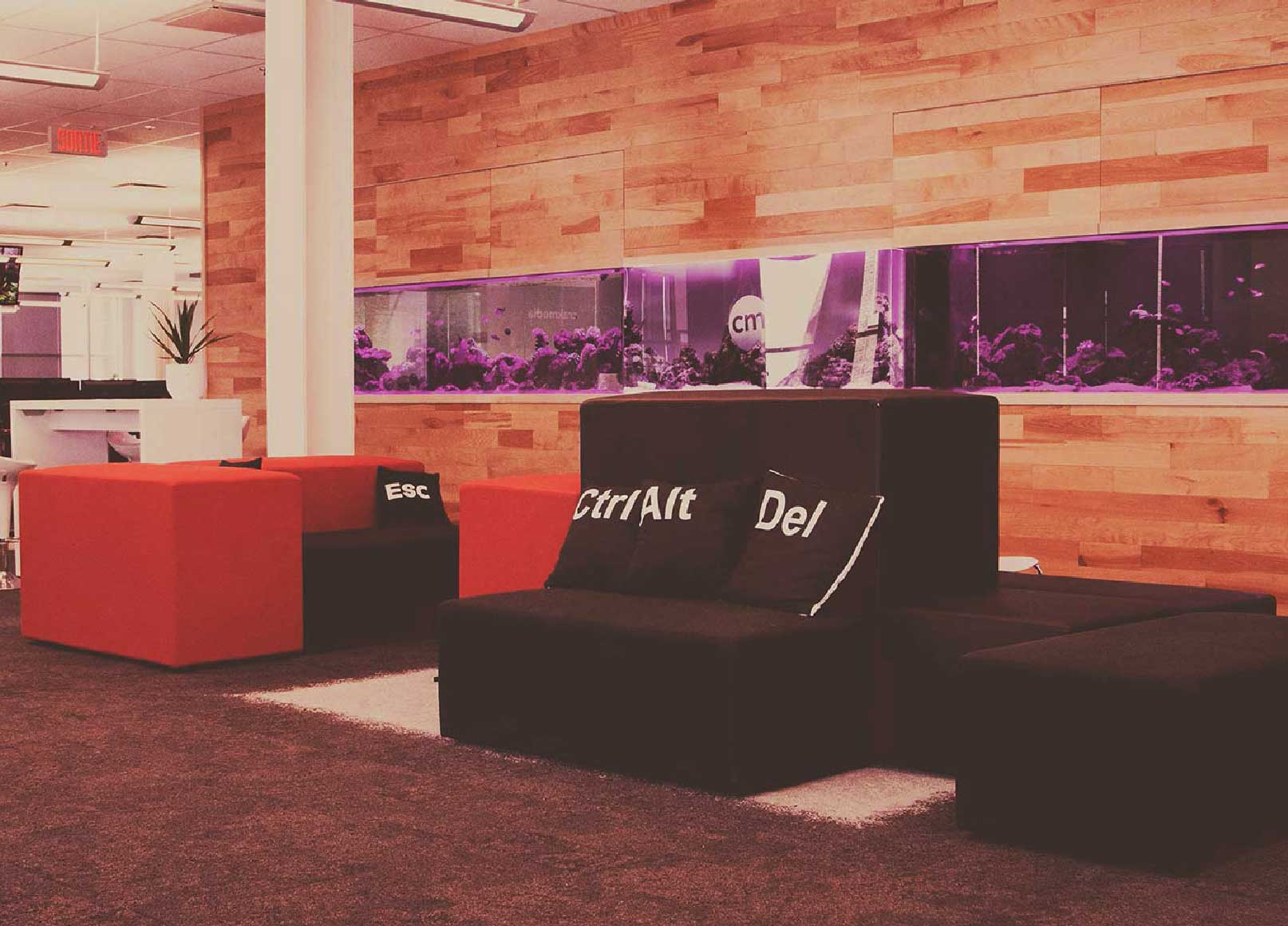On November 30, 2022, OpenAI launched the first publicly accessible version of its ChatGPT conversational agent. Since then, artificial intelligence has taken on a disproportionately large role in the news for both good and not-so-good reasons.
We hear a lot about artificial intelligence applications that seek to replace human artistic creativity. It’s a highly polarizing subject, given its consequences for artists, copyright issues and all the ethical or moral considerations associated with the generation of this type of content. However, there is a tendency to overlook the concrete applications of artificial intelligence, which are far less impressive at first glance but enable companies to meet the challenges of growth, alleviate labour shortages, and improve working conditions for their employees.
Indeed, the truly marvellous aspect of artificial intelligence lies in its ability to reproduce highly complex and tedious processes in record time. Its ability to “paint” and “write” is flashy, but it’s not the most useful aspect of artificial intelligence. Most companies are working on much more pragmatic, down-to-earth artificial intelligence solutions to help them optimize their processes.
What is artificial intelligence or AI?
Artificial intelligence is a set of techniques and theories designed to reproduce processes associated with the human intellect, such as understanding language, learning and modifying behavior, reasoning, establishing complex strategies or interpreting stimuli.
The applications of AI are numerous and already omnipresent in our lives. The algorithms of search engines like Google are optimized by machine learning, adjusting the relevance of results according to many factors. DeepL provides an excellent machine translation tool with satisfactory results in most simple contexts.
Almost all of us have used voice assistants such as Siri, Google Assistant or Alexa, with a proven track record in understanding natural language, interpreting it and responding (fairly) consistently. Autonomous cars are on the road right now in several cities worldwide, testing the algorithms that enable safe driving.
The field has been built on the foundations of computer science, statistics and a hint of cognitive science in an attempt to replicate human intelligence by essentially creating highly complex decision-making algorithms that approximate the mental processes of a human being.
For the moment, the technology is at the point of what is known as weak artificial intelligence. This term refers to artificial intelligence applications replicating only part of human cognition. For example, an automatic translator can decode the meaning of a text and translate it into another language, but this is its only capability.
Strong artificial intelligence, on the other hand, is still (fortunately?) the stuff of science fiction and refers to software capable of replicating all of a human brain’s cognitive processes. It would be able to solve complex mathematical problems, understand language, decode stimuli… in short, do any task that a human being can do and even more, given the absence of the physical limitations inherent in a human body.
!["Robots [artificial intelligence] are not going to replace humans, they are going to make their jobs much more humane. Diffucult, demeaning, demanding, dangerous, dull - These are the jobs robots will be taking." - quote by Sabine Hauert, associate professor, Bristol University](https://crakmedia.com/wp-content/uploads/2024/01/DESIGN-16138_INTELLIGENCE-ARTIFICIELLE_1920x600_QUOTE1_EN-1.png)
Artificial intelligence in 5 figures
The term artificial intelligence and its acronym AI are sprinkled everywhere in corporate marketing discourse. Everything has become intelligent or AI (even when it really isn’t), and the impact on business and our lives is significant. Here are 5 surprising or unusual statistics from the artificial intelligence rush.
30 million dollars
This is the revenue the small British island of Anguilla earned from selling its .ai domain names to technology companies worldwide. The Internet Assigned Numbers Authority is responsible for assigning top-level domains on the Internet (the famous .com, .org or .net), as well as codes for territories and countries such as .ca, .fr or .jp.
Some states are fortunate enough to be assigned a code with a specific mainstream meaning. This is the case of Tuvalu, whose .tv code is very popular with TV channels; Andorra, whose .ad code is prized by advertisers; and Armenia and Micronesia, whose .am and .fm codes are bought by radio stations.
For the island of Anguilla, the sale of .ai domain names now represents nearly 10% of their GDP!
37.3% increase
That’s the projected annual growth of the artificial intelligence market over the next 7 years. Such meteoric growth leaves plenty of room for new players to enter the AI race and carve out a place alongside the technology giants.
The growth of this sector will create many new jobs, many of them in information technology, data science and software engineering. Growth will be hampered, however, by the insufficient number of graduates from these disciplines in colleges and universities.
The development and implementation of artificial intelligence solutions will create an estimated 97 million jobs.
8 to 12 hours of work
This is the estimated number of hours a person works on tasks that could potentially be automated or, at least, optimized by artificial intelligence. The nature of these tasks is often highly repetitive, involving a low level of creativity, and contributing little to employees’ professional fulfillment. They are, therefore, perfect candidates for full or partial automation.
For employees performing these uninspiring tasks, it’s a valuable aid, enabling them to focus on business development, innovation and creation rather than maintenance. For companies, it’s an undeniable boost to productivity and revenue growth potential, as employees spend much more time on innovative projects.
For a 12-person team, even assuming an efficiency increase of only 50%, this is the equivalent of adding 1 or 2 full-time staff. In addition, these hours are spent on more interesting and motivating tasks, which are also much more profitable for the company.
1.85 trillion dollars
This is the estimated value of the artificial intelligence market in 2030, i.e. its total direct contribution to global GDP. Suppose we add its indirect contribution in terms of increased productivity. In that case, we arrive at an impressive $15.7 trillion, equivalent to the combined GDP of Germany, Japan and South America.
The impact of artificial intelligence is already significant, yet the revolution has only just begun!
300 billion words
That’s the total number of words you get if you combine all the text sources used to train GPT-3, the model behind the free version of OpenAI ChatGPT. By comparison, this is the equivalent of 267 times the content of Wikipedia or 634,249 times the complete Lord of the Rings trilogy.
This phenomenal number of words makes ChatGPT’s model extremely powerful and relatively accurate. Its 4th version, trained on a larger quantity of data and carefully optimized, can even pass the bar exam with a result placing it in the 90th percentile, i.e. higher than 90% of those who have taken the exam.
Crakmedia.AI
The practical applications of artificial intelligence in marketing are numerous, covering the entire campaign process. However, what interests us most at Crakmedia is the optimization and automation of processes in order to leave our talented teams free to innovate.
The idea is not to replace human creativity, even if it is the applications of artificial intelligence that have the greatest visibility in the media. We’ll hear a lot about ChatGPT’s ability to write a novel or DALL-E’s ability to generate artistic works in place of humans when we should really be talking about what this kind of technology can do in collaboration with us.
Artificial intelligence can hardly compete with human creativity and the subjective and abstract aspects of intelligence. We work with teams of hyper-creative experts whose ability to think outside the box is essential to support Crakmedia’s growth. Risk-taking, innovative solutions and ideas that are sometimes a little crazy but work have been at the root of our exponential growth in recent years, and no machine can match the creative genius of our people. Artificial intelligence offers attractive gains on two fronts in particular: optimizing our work and automating heavy, repetitive, but essential tasks.
Supporting growth and competitiveness
In the context of performance marketing, AI tools enable us to adapt very quickly to market fluctuations at a speed that would otherwise be entirely impossible. The AI tools at our disposal, some of which were developed in-house, give us an undeniable competitive edge over our rivals in the market and enable us to ensure sustained growth without increasing the burden on our teams. Some of these tools resulted from the AI Hackathon, during which employees were invited to imagine innovative ways of integrating artificial intelligence into the company’s activities.
For some years now, we’ve had a team of data scientists and analysts dedicated to optimizing our advertising traffic by exploiting the massive amount of data at our disposal. They use artificial intelligence methods to automate some of this work, which until recently was carried out entirely manually by our account managers and media buyers.
This work of optimizing advertizing traffic requires more than a quarter of these employees’ time! Even so, this only allows them to optimize around 10% of the 5,000-plus advertising spaces under Crakmedia’s management every week. These people’s primary role and great expertise is prospecting and negotiation, not optimization, although they become highly efficient after several years of experience.
It’s a perfect example of a long, complex and humanly impossible task for our team to succeed in optimizing 100% of Crakmedia’s web traffic. It’s the ideal context to apply artificial intelligence to lighten these tasks and allow our teams to focus entirely on business development, which is their specialty.
Challenges and ethics of artificial intelligence
Most recently, OpenAI was the target of a lawsuit from the New York Times, whose journalistic archives were among the texts that fed the model on which GPT-3 was based. The publisher is suing OpenAI and Microsoft for potentially infringing its copyrights by training their conversational robot on their data.
The courts will have to rule on whether or not the use of their article bank, to which access is subject to a fee, is considered reasonable use. ChatGPT has reportedly been caught providing almost identical articles to those written by people from The Times without properly quoting them. The same phenomenon has been observed among visual artists, some of whose works have been not-so-subtly reinterpreted by generative artificial intelligence tools.
The notion of “reasonable use” remains at the heart of the debate: where is the line between drawing inspiration from artistic works and copying them? Are copyrights due? By their very nature, artificial intelligence tools are trained on texts or images created by writers and artists. The result of queries will necessarily be based on the data on which the tools have been trained.
A resemblance to existing works is possible and is not remarkably different from an artist seeking inspiration from the artists they admire. However, artificial intelligence tools will probably struggle to generate innovative content fundamentally different from what already exists.
This is where the use of artificial intelligence as a support and work optimization tool comes into its own. We let graphic designers create innovative and unique visual concepts, but we’ll use AI to generate visual elements that would take far too long to create manually. We can also make quick changes to existing visuals to adapt them during a campaign or develop proofs of concept before a designer works on the final visual. In performance web marketing, time is a scarce resource that we need to use optimally and responsibly.
We have a small copywriting team working hard to deliver high-quality texts in large quantities. For them, using artificial intelligence tools can provide support in proofreading texts or making a text written in their second language more idiomatic. Tools such as ChatGPT can also be used to provide text variations for SEO optimization or A/B testing. Automatic translators can translate simple or repetitive parts of texts that only require proofreading and adjustments. A professional is entrusted with the more complex, creative and abstract parts of a text.

Artificial intelligence in a nutshell
Artificial intelligence technologies are becoming an increasingly important part of our lives, and this can be a legitimate source of concern. Technology giants and the media are giving a great deal of prominence to tools that emulate human creativity, which spotlight the profound ethical issues associated with them, most notably those of intellectual property and the fear of job losses.
However, the vast majority of companies are not replacing anyone with artificial intelligence. On the contrary, artificial intelligence is helping to sustain business growth at a time when the job market is going through a difficult period. We can’t hire a workforce that doesn’t exist: there are almost 176,000 job vacancies in Quebec, more people than ever are retiring, and the unemployment rate is below 5%. Such a rate actually represents what we call the natural rate of unemployment, i.e. the minimum percentage of people who are unemployed at any given time due to the natural workings of the labor market (resignations, cyclical layoffs, seasonal work, career transitions, etc.).
Factories are increasingly automating their production lines, not to replace workers but because they can’t find any. In addition, automated tasks often impossible for human beings to carry out are highly repetitive or dangerous. At Crakmedia, we don’t do anything dangerous, of course, but we do face recruitment issues for certain specialized positions. Automating some of their work frees up time to reallocate our employees to activities that support our growth and innovation.
We can never replace a person’s creativity, and it would be a mistake to make it the goal of artificial intelligence. However, we can improve our employees’ working conditions, foster their personal development, and ensure the company’s continued growth by using artificial intelligence in a logical, responsible and ethical way to support the spirit of innovation, not replace it.
PS: Have you noticed an AI translator translated the article almost entirely from the French version? It did need some editing but it cut the translation process by almost 75 %!
_____
Would you like to live the Crakmedia experience with an employer who cares about your personal and professional development? Explore our job offers or submit an unsolicited application: crakmedia.com/careers/

Share






